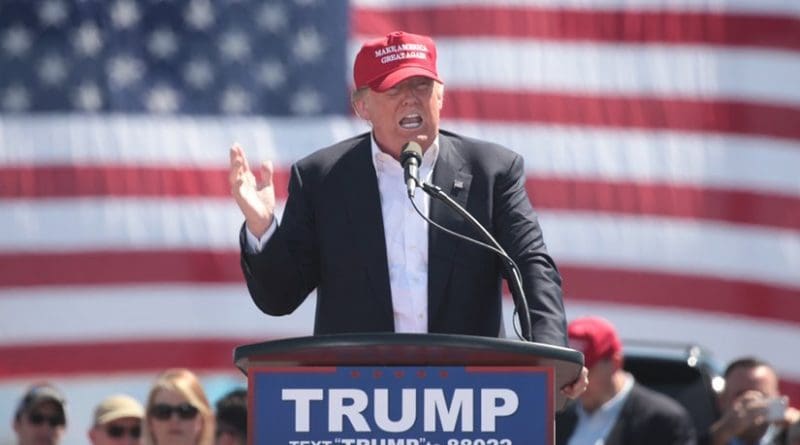A New Era For US Foreign Policy? – Analysis
By IPCS
By Lars Brozus*
After 1945, Washington’s approach to international politics was by and large based on ideas linked to the notion of “liberal internationalism.” A bipartisan consensus existed postulating that a liberal international order – defined by norms and institutions in support of open societies and markets – was in the US’s core interest. Included in that consensus was support for a generous immigration policy as well as liberalised trade and financial relations. International institutions and alliances were created to protect this order. Hence Washington’s support for the UN system, the international financial institutions (World Bank, IWF) and NATO, among many others.
There also was a shared understanding in US politics that Washington’s leadership was essential to preserve the liberal international order. Therefore, disproportionally high contributions from the US budget to maintain this order were reasonable: Washington’s benefit from a more-or-less stable and predictable international environment that was governed by rules manufactured “at home” outweighed any over-investment. Even more so as these investments enabled the US to project both hard and soft power globally.
In contrast to this bipartisan consensus on foreign policy, the incoming US President Donald Trump perceives international politics as a zero sum-game: one side wins what the other side loses. Washington’s commitments to defend Japan and South Korea or to deter Russia from invading Europe come at the expense of American citizens (aka taxpayers). The creation of the North American Free Trade Agreement (NAFTA) and China’s accession to the WTO contributed to the loss of manufacturing jobs in the homeland. In this view, establishing and maintaining the liberal international order has contributed to the decline of US industry and the American working class.
Accordingly, “America first” is the key phrase of Trump’s foreign policy agenda. He intends to push for better international deals: fair trade instead of free trade. The European and Asian allies should pay more for their security, and the US should no longer be disadvantaged by international pacts such as the 2015 Paris climate accord or international trade agreements such as the TPP and TTIP.
However, it would be wrong to portray Trump as an isolationist. Quite to the contrary: he has announced that his administration will rebuild America’s military force, and promised to take extreme measures against the “Islamic State,” even – and this is revealing of his anti-multilateralist position – including actions that violate international law. Trump’s agenda should not be equated with a renouncement of global leadership. What changes is rather the interpretation of this role: less so in terms of a benign hegemon in favour of a rule-bound multilateralism, and more in terms of a self-interested highly selective bilateral approach to international politics.
It is not clear yet what the effects on Europe and the EU will be. On the one hand, many governments fear that a self-interested and more inward-looking US might provoke Russia into testing the strength of the NATO and European solidarity. Trump’s triumph has been welcomed by right-wing populists all over Europe such as Marine Le Pen who is a contender in the French presidential elections scheduled for 2017. Nigel Farage, the former head of UK’s Independence Party, has close contacts to Trump. It is a worrying perspective that right-wing populists could become the US’ favourite partners in Europe. On the other hand, and in view of the changing nature of the transatlantic alliance, the EU needs to be clear about its interests. Berlin and Brussels will, most likely, face growing pressure to do more for Europe’s defence. This opens an opportunity for increased cooperation.
Of course, it remains to be seen whether Trump will actually be able to implement his foreign policy agenda. His critics on both sides of the Atlantic point to restrictions that are inherent in the system of checks and balances that characterises the US’ political system. In the US, constitutionally, authority over foreign policy is divided between the president and Congress. The Congress has three major options to influence foreign policy: via budget legislation; the confirmation of high-ranking government officials; and its approval of internationally binding treaties. Additionally, the US Congress may also articulate foreign policy positions of its own. Take Russia for example: in the Kremlin’s view, Trump’s election presents a window of opportunity for the normalisation of diplomatic relations. A new Yalta (where in 1945 the victorious Allied powers met to divide the world amongst them) with bilaterally recognised and respected “zones of influence” would be the result. However, Trump’s administration might be limited by the anti-Russian positions within the Republican Party, which holds the majority in Congress.
However, make no mistake, because whether and to what extent President Trump could be reined in by the US Congress depends on the thematic issues in question. The latter tends to play a more significant role in areas including trade, migration and development cooperation, than in issues of national security. The concentration of foreign policy authority in the executive branch of government, namely the White House, should also be taken into account.
*Lars Brozus
Stiftung Wissenschaft und Politik (SWP), Berlin

